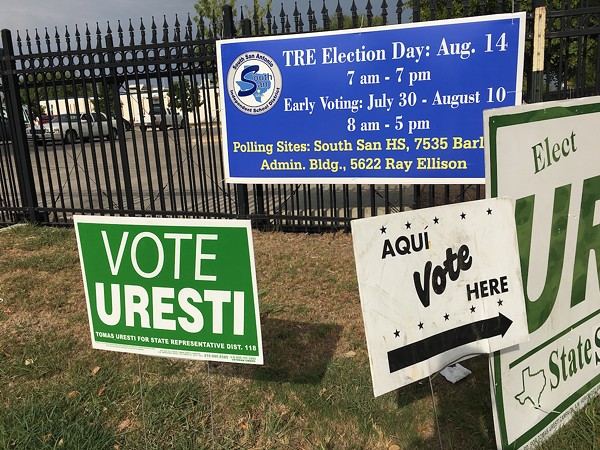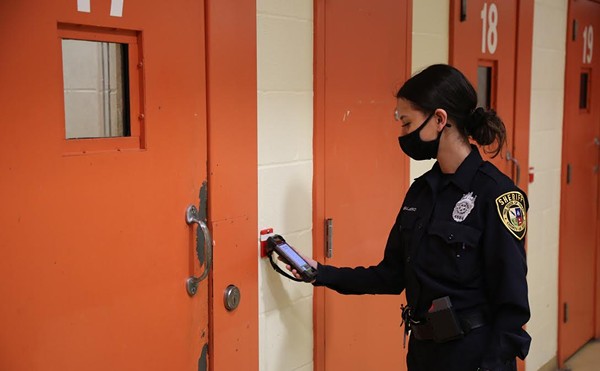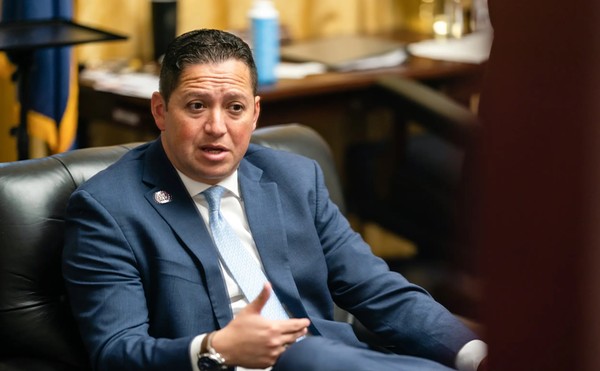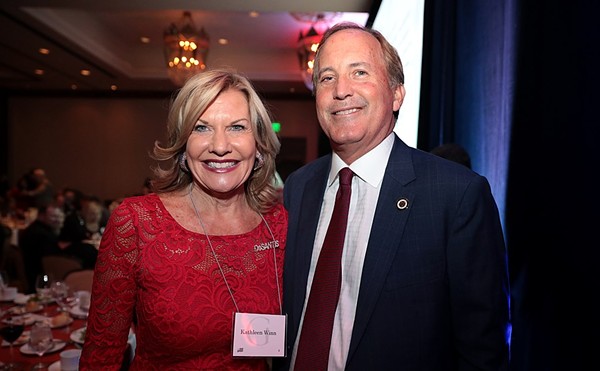The Next South San Superintendent Will Grapple with a Budget Shortfall, Students and Their Families Leaving the District – and Connie Prado
By Bekah McNeel on Wed, Sep 12, 2018 at 7:30 am
Superintendent Abelardo Saavedra has been good for South San, one of the school districts in Bexar County that’s been bleeding students and already-scarce tax revenue for years. Under Saavedra, South San’s school have improved overall and the district has worked its way out of state conservatorship.
But as he prepares to retire, big challenges – including a yawning budget gap – are piling up for the next superintendent.
It’s not an enviable position. Apart from those obstacles, the new superintendent will likely be held to a higher standard because of Saavedra’s performance.
“Saavedra is a legend in Texas education,” said James Guerra, the school board’s executive search consultant. The former Houston ISD superintendent came out of retirement to lead the troubled district, which Guerra called a “major coup.” The past five years have been marked by steady improvement – so much so that the search for Saavedra’s replacement drew 32 applicants across eight states. “The pool (was) incredibly deep,” he said.
Only a handful dropped out after the August 14 election where the voters of South San ISD rejected a tax rate increase that would have closed the $6.4 million budget deficit created by falling enrollment. The applicants who remained knew they had to be “ready for the fight,” Guerra said. Coming into a district with a budget deficit, he said, “there’s no honeymoon period.”
Saavedra warns that the new superintendent should be ready for a different kind of fight. The loss at the polls means more than just budget woes. The campaign bore all the hallmarks of the kind of power struggles that ran off several superintendents before Saavedra.
Board member Connie Prado’s role in the defeat of the so-called tax ratification election (TRE) can’t be understated. The TRE came at a bad time since the district had closed schools in her area, Prado said. “The voting results overwhelmingly reinforce that community opposition. Closing schools was a huge mistake and has had negative ramifications,” Prado said in an email to the Current.
But she didn’t just let the community speak, City Councilman Rey Saldaña said during the TRE campaign – she rallied them. “I’ve never seen someone work so hard to keep money from kids,” he said.
Prado’s anti-TRE campaign was effective. Her home precinct had the highest voter turnout, and was responsible for a sizable portion of the “no” votes. Prado chauffeured voters to the polls, and a PAC supported by her husband flooded the district with anti-tax ratification literature. She also wrote an op-ed for MySanAntonio.com urging voters to vote “no” because the district was not spending money wisely. If that sounds like an odd allegation coming from a veteran board member, then you’re hearing it right.
In most cases, a tax election is seen as a referendum on the board and administration. If voters like what they see, the board gets more money. If they don’t like the board’s spending, they’re unlikely to agree to higher tax bills.
In this case, even though the tax ratification failed, a precinct-by-precinct analysis of the vote showed that all but two single-member districts out of seven voted with their board trustee, giving them a thumbs-up.
Only Elda Flores and Luis Rodriguez failed to gain support from their districts. Rodriguez is up for re-election in November, and his opponent, Gilbert Rodriguez is said to be a charismatic guy who’s backed by Prado.
The November election will likely be even more intense than the August campaign. Board President Angelina Osteguin, also up for re-election, is facing a nasty smear campaign from the anonymous activist publication La Voz.
Her opponent, Mandy Martinez, said she had nothing to do with the unofficial campaign literature, and called it gossip. “It does seem degrading,” she said.
Martinez herself was prompted to run by the closure of Kazen Middle School, where two of her children went. She wants a stronger board voice for parents and students. While she says she is still learning about Lone Star Governance and the System of Great Schools – state initiatives embraced by Saavedra and the current board – she is a fan of the innovation, and wants to see the improvement programs refined and improved.
Osteguin is confident that all seven candidates on the November ballot know what’s at stake for the district, especially with the deficit budget. Financial mismanagement and board dysfunction were the reasons that the Texas Education Agency sanctioned the district and appointed a conservator in 2016. The conservator was removed in 2018, in large part to the district’s participation in Lone Star Governance, which Osteguin has championed.
Inheriting a deficit budget is intimidating, sure, Guerra said, but the district’s participation in the state’s Lone Star Governance program and the System of Great Schools initiative were major selling points for highly qualified superintendent candidates who saw it as a sign that the district is eager to improve.
And there’s no choice but to improve, Saavedra said. Under the state’s new accountability system, which debuted this year, the previously stable district of 5,000 students scored a D. “The standards are different, I understand that – but nonetheless, we got a D,” Saavedra said. In other words, that’s not acceptable.
That’s why the tax election loss comes at a particularly bad time. “If ever there’s a need for money to support instruction, that’s now,” Saavedra said.
Should Osteguin and Rodriguez lose their elections, it’s possible that Prado would be able to garner the support she needs to win back the board presidency. If that happens, Saavedra said, the new superintendent should be ready to fight for control of district operations.
Prado’s demonstrated support for Lone Star Governance and the System of Great Schools has been lukewarm, and district administration says she still tries to “micromanage,” as noted by the conservator’s reports throughout 2017. In August 2017, conservator Judy Castleberry wrote, “The most significant challenge facing this Board is the lack of unity of focus on student outcomes.” She goes on to attribute that to Prado’s strong interest in administrative matters. In October 2017, Castleberry referenced specific questions Prado asked during a board meeting, reporting that, “One Board member continues to try to micromanage.”
For her part, Prado says she supports the board.
“We work well on a majority of issues,” she said. But she admits there has been tension with administration over issues like teacher salaries. Still, she said she doesn’t want the school board to have as much administrative control as it had in the past, and she that looks forward to working with the new superintendent.
Stay on top of San Antonio news and views. Sign up for our Weekly Headlines Newsletter.
But as he prepares to retire, big challenges – including a yawning budget gap – are piling up for the next superintendent.
It’s not an enviable position. Apart from those obstacles, the new superintendent will likely be held to a higher standard because of Saavedra’s performance.
“Saavedra is a legend in Texas education,” said James Guerra, the school board’s executive search consultant. The former Houston ISD superintendent came out of retirement to lead the troubled district, which Guerra called a “major coup.” The past five years have been marked by steady improvement – so much so that the search for Saavedra’s replacement drew 32 applicants across eight states. “The pool (was) incredibly deep,” he said.
Only a handful dropped out after the August 14 election where the voters of South San ISD rejected a tax rate increase that would have closed the $6.4 million budget deficit created by falling enrollment. The applicants who remained knew they had to be “ready for the fight,” Guerra said. Coming into a district with a budget deficit, he said, “there’s no honeymoon period.”
Saavedra warns that the new superintendent should be ready for a different kind of fight. The loss at the polls means more than just budget woes. The campaign bore all the hallmarks of the kind of power struggles that ran off several superintendents before Saavedra.
Board member Connie Prado’s role in the defeat of the so-called tax ratification election (TRE) can’t be understated. The TRE came at a bad time since the district had closed schools in her area, Prado said. “The voting results overwhelmingly reinforce that community opposition. Closing schools was a huge mistake and has had negative ramifications,” Prado said in an email to the Current.
But she didn’t just let the community speak, City Councilman Rey Saldaña said during the TRE campaign – she rallied them. “I’ve never seen someone work so hard to keep money from kids,” he said.
Prado’s anti-TRE campaign was effective. Her home precinct had the highest voter turnout, and was responsible for a sizable portion of the “no” votes. Prado chauffeured voters to the polls, and a PAC supported by her husband flooded the district with anti-tax ratification literature. She also wrote an op-ed for MySanAntonio.com urging voters to vote “no” because the district was not spending money wisely. If that sounds like an odd allegation coming from a veteran board member, then you’re hearing it right.
In most cases, a tax election is seen as a referendum on the board and administration. If voters like what they see, the board gets more money. If they don’t like the board’s spending, they’re unlikely to agree to higher tax bills.
In this case, even though the tax ratification failed, a precinct-by-precinct analysis of the vote showed that all but two single-member districts out of seven voted with their board trustee, giving them a thumbs-up.
Only Elda Flores and Luis Rodriguez failed to gain support from their districts. Rodriguez is up for re-election in November, and his opponent, Gilbert Rodriguez is said to be a charismatic guy who’s backed by Prado.
The November election will likely be even more intense than the August campaign. Board President Angelina Osteguin, also up for re-election, is facing a nasty smear campaign from the anonymous activist publication La Voz.
Her opponent, Mandy Martinez, said she had nothing to do with the unofficial campaign literature, and called it gossip. “It does seem degrading,” she said.
Martinez herself was prompted to run by the closure of Kazen Middle School, where two of her children went. She wants a stronger board voice for parents and students. While she says she is still learning about Lone Star Governance and the System of Great Schools – state initiatives embraced by Saavedra and the current board – she is a fan of the innovation, and wants to see the improvement programs refined and improved.
Osteguin is confident that all seven candidates on the November ballot know what’s at stake for the district, especially with the deficit budget. Financial mismanagement and board dysfunction were the reasons that the Texas Education Agency sanctioned the district and appointed a conservator in 2016. The conservator was removed in 2018, in large part to the district’s participation in Lone Star Governance, which Osteguin has championed.
Inheriting a deficit budget is intimidating, sure, Guerra said, but the district’s participation in the state’s Lone Star Governance program and the System of Great Schools initiative were major selling points for highly qualified superintendent candidates who saw it as a sign that the district is eager to improve.
And there’s no choice but to improve, Saavedra said. Under the state’s new accountability system, which debuted this year, the previously stable district of 5,000 students scored a D. “The standards are different, I understand that – but nonetheless, we got a D,” Saavedra said. In other words, that’s not acceptable.
That’s why the tax election loss comes at a particularly bad time. “If ever there’s a need for money to support instruction, that’s now,” Saavedra said.
Should Osteguin and Rodriguez lose their elections, it’s possible that Prado would be able to garner the support she needs to win back the board presidency. If that happens, Saavedra said, the new superintendent should be ready to fight for control of district operations.
Prado’s demonstrated support for Lone Star Governance and the System of Great Schools has been lukewarm, and district administration says she still tries to “micromanage,” as noted by the conservator’s reports throughout 2017. In August 2017, conservator Judy Castleberry wrote, “The most significant challenge facing this Board is the lack of unity of focus on student outcomes.” She goes on to attribute that to Prado’s strong interest in administrative matters. In October 2017, Castleberry referenced specific questions Prado asked during a board meeting, reporting that, “One Board member continues to try to micromanage.”
For her part, Prado says she supports the board.
“We work well on a majority of issues,” she said. But she admits there has been tension with administration over issues like teacher salaries. Still, she said she doesn’t want the school board to have as much administrative control as it had in the past, and she that looks forward to working with the new superintendent.
Stay on top of San Antonio news and views. Sign up for our Weekly Headlines Newsletter.

KEEP SA CURRENT!
Since 1986, the SA Current has served as the free, independent voice of San Antonio, and we want to keep it that way.
Becoming an SA Current Supporter for as little as $5 a month allows us to continue offering readers access to our coverage of local news, food, nightlife, events, and culture with no paywalls.
Scroll to read more San Antonio News articles
Newsletters
Join SA Current Newsletters
Subscribe now to get the latest news delivered right to your inbox.

















